When it comes to restoring the beauty of your smile, both veneers and crowns offer exceptional solutions. However, each treatment comes with its own unique considerations. Choosing the right one can often feel like navigating through a maze of dental jargon. But don’t worry, we’re here to help.
In this article, we’ll break down the key differences between veneers and crowns, so you can make an informed decision for your dental care needs.
What are Dental Crowns?
Dental crowns, often referred to as “caps,” are personalized coverings placed over the entire tooth. They are typically used when a tooth is damaged or decayed to such an extent that fillings can’t restore it back to its healthy state. Made from a variety of materials, including porcelain, ceramic, or metal alloys, crowns are designed to look and feel like your natural tooth.
They work to improve the tooth’s strength, shape, and overall appearance, ensuring both functional and cosmetic enhancement. With proper care, dental crowns can provide a long-term solution for preserving your smile.
Ideal Candidates for Dental Crowns
Ideal candidates for dental crowns are individuals with severely damaged or decayed teeth. Dental crowns are recommended when the damage to a tooth is so extensive that lesser measures, such as fillings or onlays, can’t effectively restore its function and aesthetic. Here are some key reasons why you might be an ideal candidate for dental crowns:
- Large fillings: When a tooth has a large filling, it becomes weaker and more vulnerable to breaking. A dental crown can provide the necessary support for the tooth, preventing further damage.
- Root canal treatment: After undergoing a root canal procedure, teeth are often left weakened and brittle. A dental crown can strengthen the treated tooth, protecting it from fractures or other complications.
- Cosmetic enhancement: Dental crowns can also be used for cosmetic purposes. They can improve the appearance of a misshapen or discolored tooth, giving you a brighter and more confident smile.
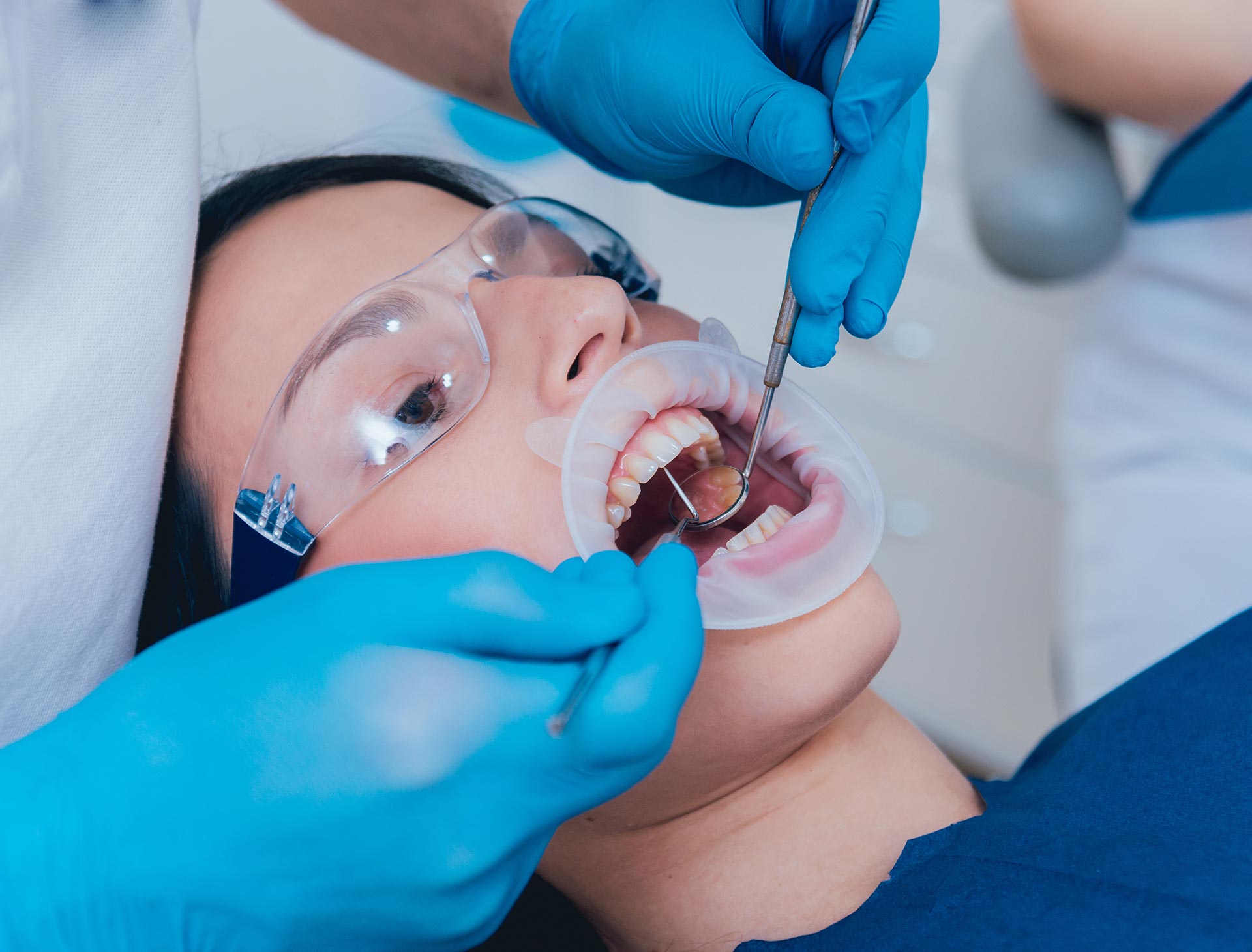
Advantages of Dental Crowns
Dental crowns offer several significant advantages that contribute to their popularity in dental restoration:
Dental crowns are renowned for their longevity. When properly cared for through regular dental hygiene practices such as brushing and flossing, Cleveland Clinis says dental crowns can last upwards of 30 years with proper care and maintenance. (1) Their robust construction, often from materials like porcelain or metal alloys, can withstand the daily pressures of chewing and biting. This makes dental crowns a long-term investment in your oral health and overall well-being.
Customization
Dental crowns are customized to match your natural teeth’ shape, size, and color. This ensures a seamless integration with the rest of your smile, making it virtually indistinguishable from your real teeth. With the help of advanced technology and skilled dentists, you can achieve a flawless smile that looks and feels natural.
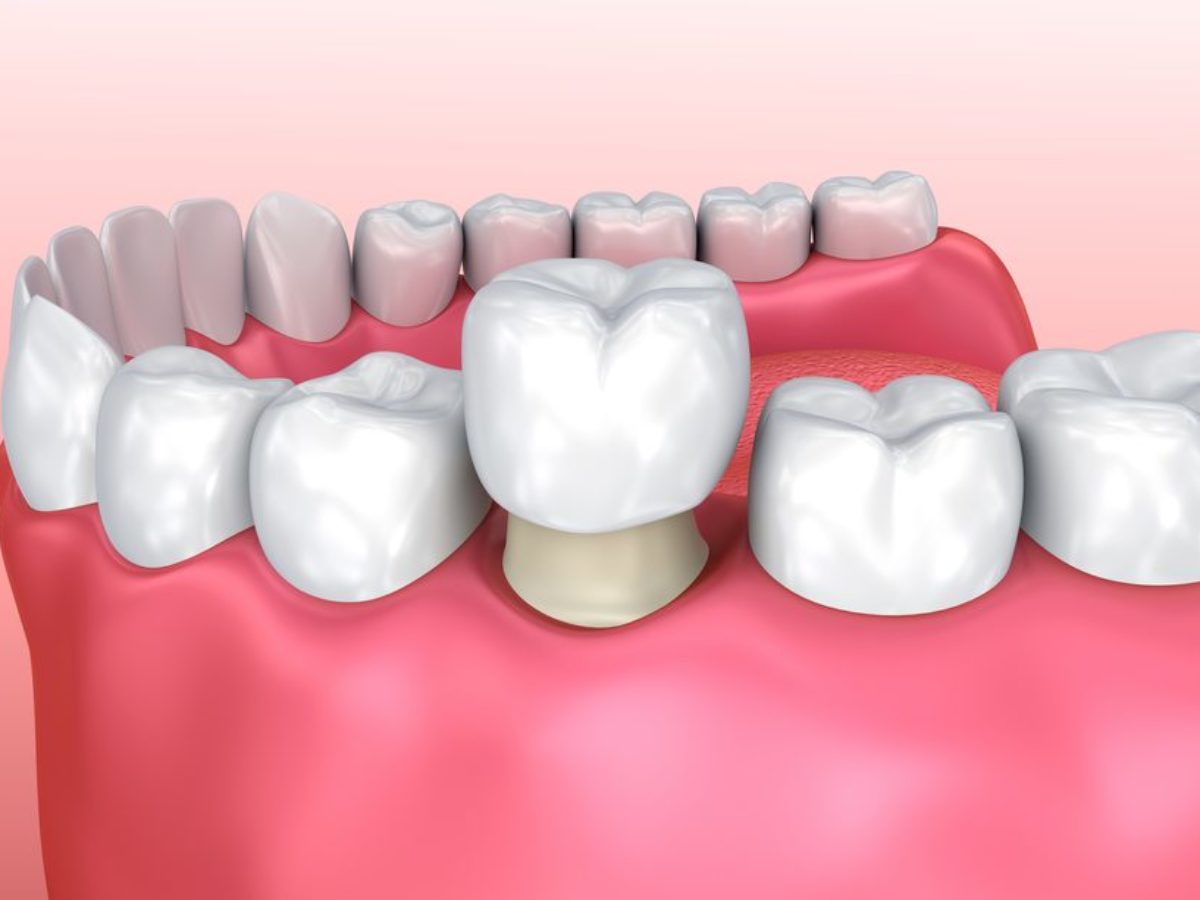
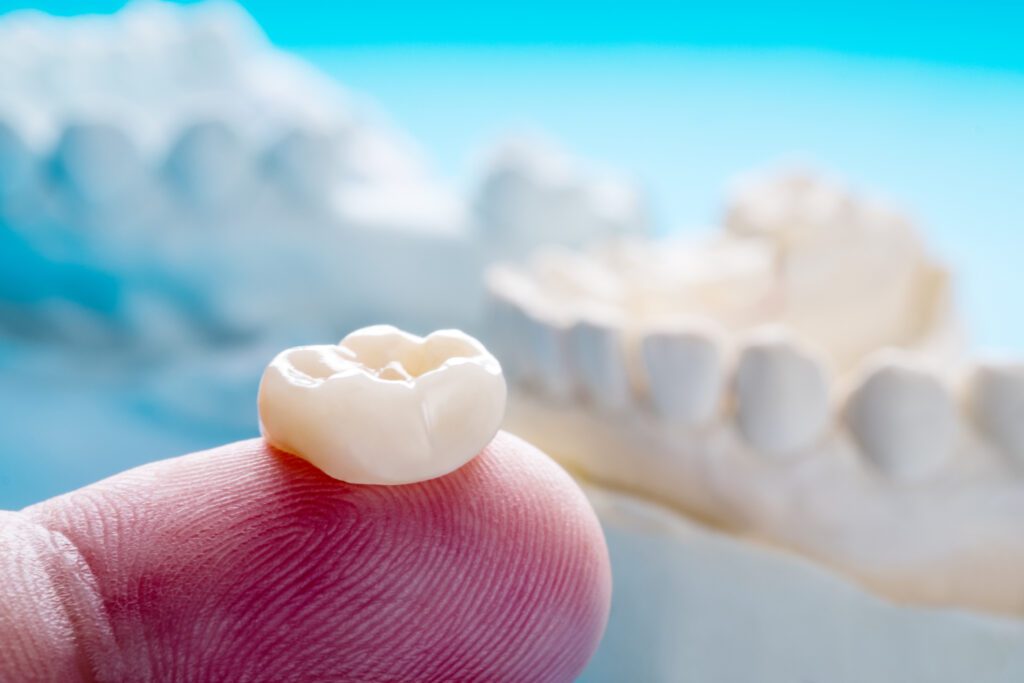
Dental crowns are versatile in their ability to address various dental issues. They can be used to protect a weak or damaged tooth, improve its appearance, or even serve as an anchor for a dental bridge. This versatility makes them an essential tool in a dentist’s arsenal for restoring and preserving oral health.
Protection
Dental crowns provide a protective barrier for damaged or weakened teeth, preventing further decay and damage. By acting as a “cap,” they shield the underlying tooth from bacteria and plaque that can cause future issues. This protection is especially beneficial for individuals with a history of dental problems or those prone to tooth decay.
Disadvantages of Dental Crowns
While dental crowns are an effective solution for many dental issues, like all treatments, they come with a few potential disadvantages that should be considered:
- Invasive Procedure: Dental crowns require a significant portion of the original tooth to be filed down or removed to fit the crown properly. This can make the procedure more invasive compared to other restorative options, such as veneers.
- Possible Sensitivity: After the placement of a dental crown, you may experience sensitivity in the tooth, especially when consuming hot or cold foods and drinks. This is usually temporary and can be managed with appropriate dental products.
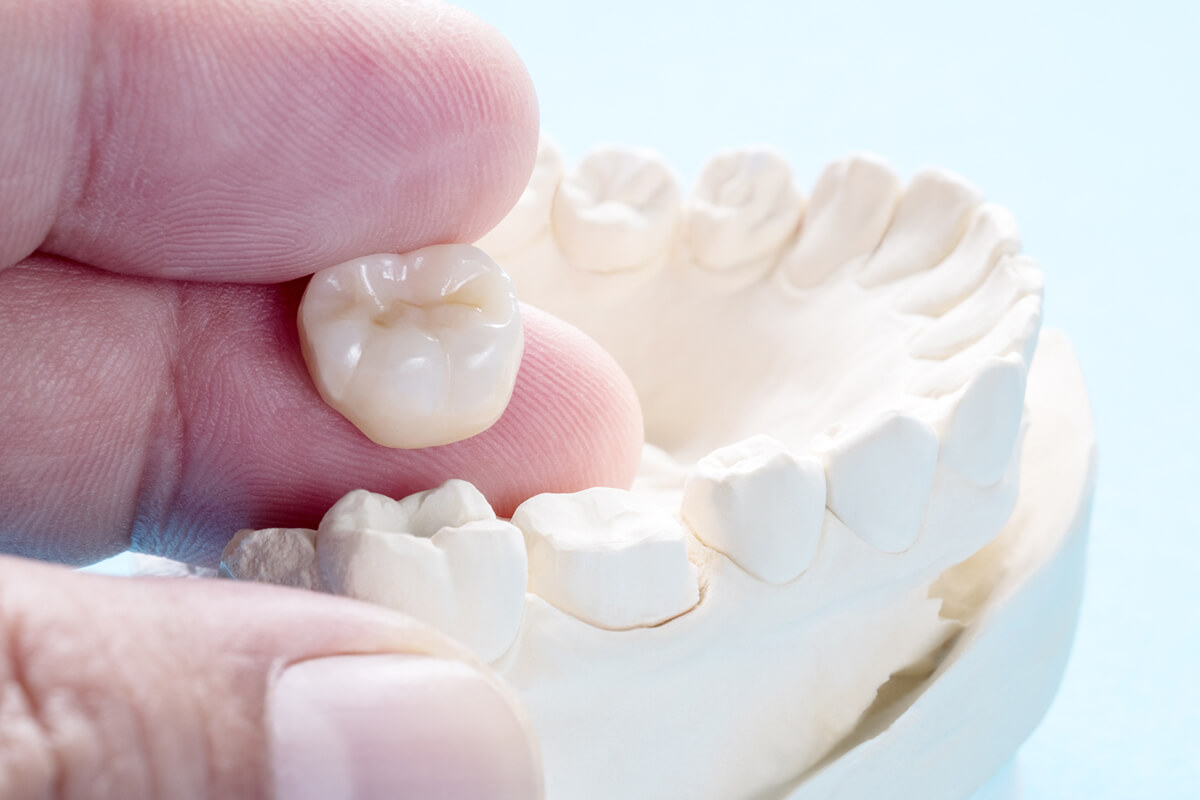
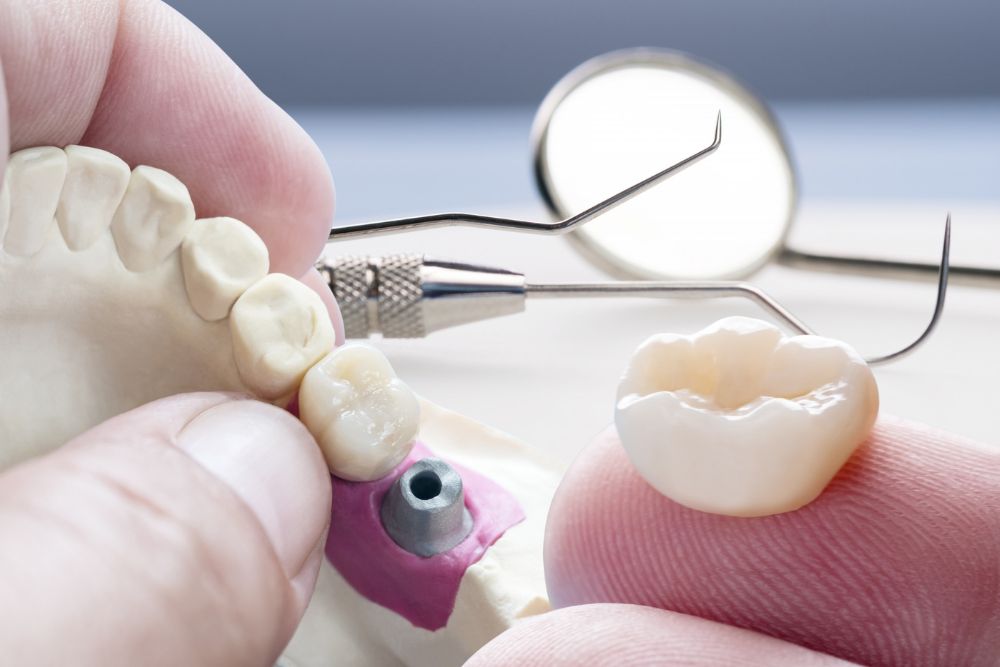
- Potential for Damage: Although dental crowns are designed to be durable, they can still crack or chip, especially when exposed to excessive pressure or impact. Regular check-ups can ensure timely detection and repair of any damage.
- Cost: Dental crowns can be more expensive than other dental restoration options, depending on the material used and the complexity of the procedure. However, remember that their durability and long lifespan can make them a cost-effective solution in the long run.
What are Dental Veneers?
Dental veneers are thin, custom-made shells designed to cover the front surface of your teeth. They are typically made from porcelain or composite resin materials and are permanently bonded to your teeth. Veneers are used to correct a range of dental issues, including discolored, chipped, misshapen, or smaller-than-average teeth.
Being less invasive than dental crowns, veneers are an excellent choice for improving the appearance of your front teeth specifically. They offer a natural-looking solution with strength and resilience akin to natural tooth enamel. Veneers are also stain-resistant, making them an excellent choice for those seeking a consistently bright and beautiful smile.
“It is crucial to acknowledge that a veneer can only be applied to a tooth with an adequate amount of existing enamel, as emphasized by University General Dentists.” (2)
Ideal Candidates for Veneers
Dental veneers are a suitable option for patients with healthy teeth and gums who want to improve their smile’s appearance. Ideal candidates for veneers may have cosmetic dental concerns such as:
- Discolored teeth: Teeth that have become discolored due to medication, excessive fluoride use, or root canal treatment can be improved with veneers. They provide a bright and uniform appearance, eliminating any unsightly discoloration.
- Chipped or broken teeth: Veneers can effectively cover up chips and breaks in your front teeth, restoring their original appearance.
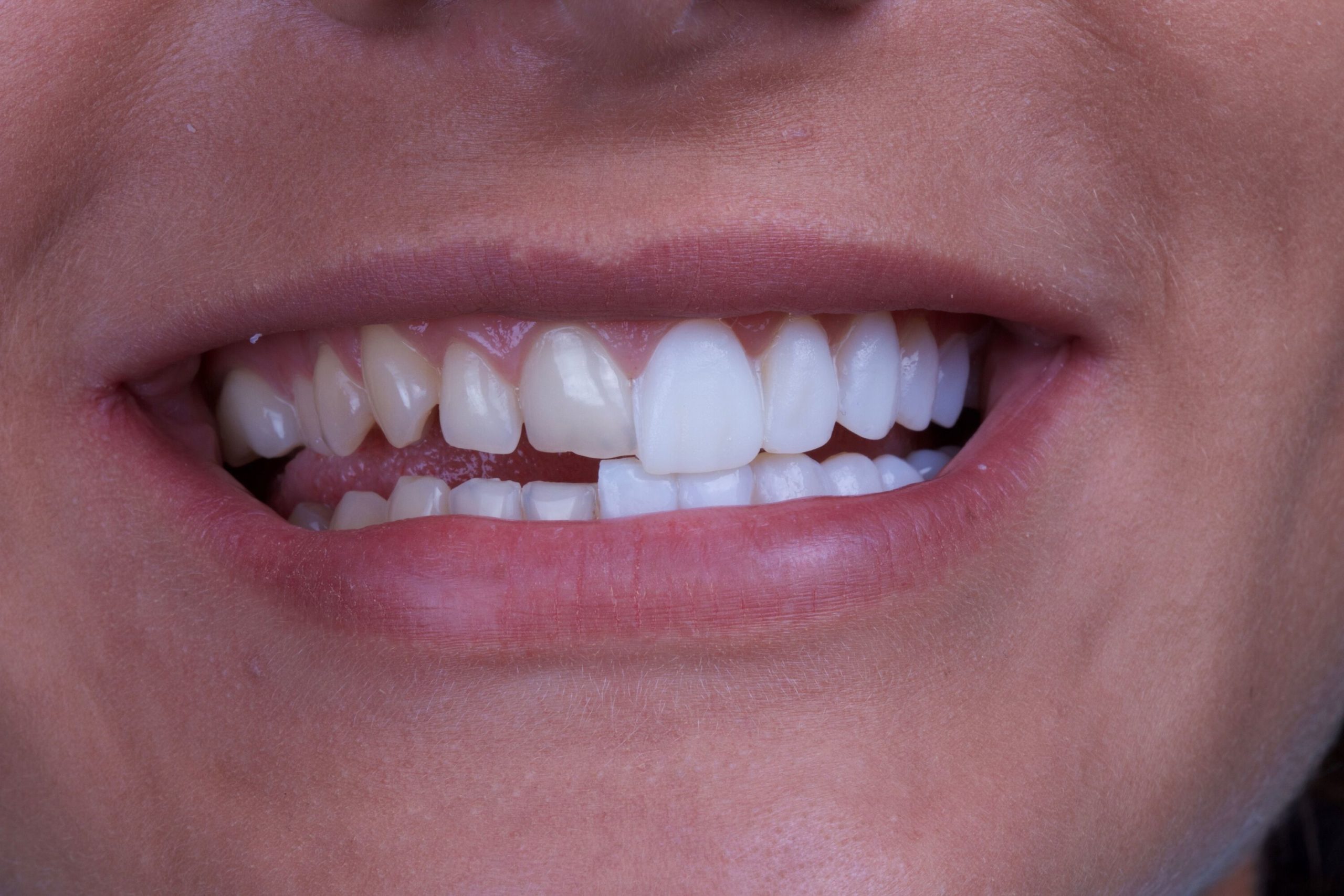

- Minor alignment issues: Veneers can correct minor misalignments, such as small gaps or crooked teeth. They can also provide the appearance of straighter teeth without the need for braces.
- Unusually shaped or sized teeth: Some people may have naturally smaller or misshapen teeth that affect the overall aesthetics of their smile. Veneers can help improve these teeth’ shape, size, and symmetry, creating a more balanced and attractive smile.
Advantages of Dental Veneers
Dental veneers offer many advantages that make them a popular choice for cosmetic dental treatments:
One of the key advantages of dental veneers is their ability to deliver remarkably natural-looking results. Crafted from materials that mimic the properties of natural tooth enamel, veneers reflect light in a similar way, resulting in an enhanced yet natural appearance. In addition, veneers are custom-made to fit the size, shape, and color of your existing teeth, and dentists can adjust the color of the veneers to match the shade of your natural teeth.
This customization offers a seamless blend with your smile, ensuring that the veneers do not appear artificial. So, whether you’re speaking, smiling, or laughing, it’s virtually impossible for others to tell the difference between your veneers and your natural teeth.

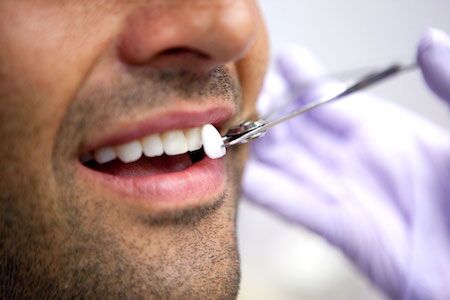
Compared to dental crowns, veneers are a less invasive treatment option as they require minimal removal of tooth structure. This makes them an attractive choice for those seeking a solution that preserves their natural teeth as much as possible.
Stain-Resistant
An outstanding benefit of dental veneers is their resistance to stains. Unlike natural teeth, which can be discolored over time by things like coffee, tea, wine, or tobacco use, the material used to make veneers is resistant to these common staining agents. This characteristic allows veneers to maintain their bright and white appearance over the long term, making them an excellent option for those who are particularly concerned about tooth discoloration.
Disadvantages of Veneers
While veneers offer many advantages, you should also consider these potential disadvantages before deciding on this treatment:
- Higher Upfront Cost: Veneers can be more expensive than other cosmetic dentistry options, making them a significant investment. However, their long lifespan and minimal maintenance requirements can make them cost-effective in the long run.
- Not Suitable for Extensive Damage: Veneers are not suitable for severely damaged or decayed teeth. In such cases, dental crowns may be a more appropriate treatment option.
- Irreversible Procedure: Once the enamel is filed down to place veneers, this process cannot be reversed. This means that you will need to have veneers for the rest of your life and replace them every 10-15 years.
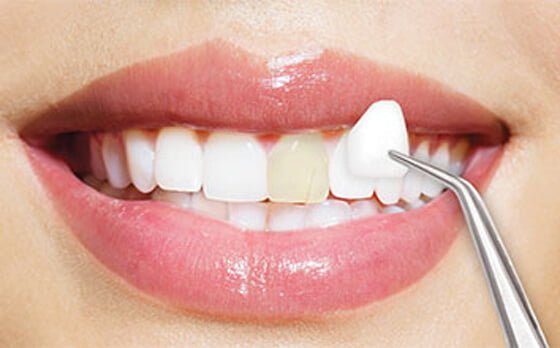
Cost of Veneers and Crowns
According to the American Cosmetic Dentistry organization, the cost for a veneer can range between $925 to $2,500 per tooth. (3) This price variation is influenced by factors such as the material used for the veneer, the case’s complexity, and the dental practice’s location.
On the other hand, dental crowns can range in price from $500 to $3,000 per tooth, depending on the material used. (4) These costs can also be higher for more complex cases or if you opt for premium materials.
Veneers vs. Crowns: Making the Right Choice
When deciding between veneers and crowns, it’s essential to consult with your dentist to determine the best option for your individual needs. While veneers are ideal for cosmetic improvements, dental crowns may be better for addressing structural issues or extensive damage.
When deciding between veneers and crowns, it’s important to consider several factors.
- Extent of Dental Damage: Veneers may be the ideal solution if your tooth has minor cosmetic issues, such as discoloration or small chips. However, a crown will provide more comprehensive coverage and protection if your tooth is severely decayed or damaged.
- Budget: As previously discussed, veneers tend to be more expensive than crowns. If cost is a significant concern for you, this may influence your decision.
- Longevity: While both veneers and crowns are durable, they do have different lifespans. On average, veneers last 10-15 years, while crowns can last 15-30 years or longer with good dental hygiene.
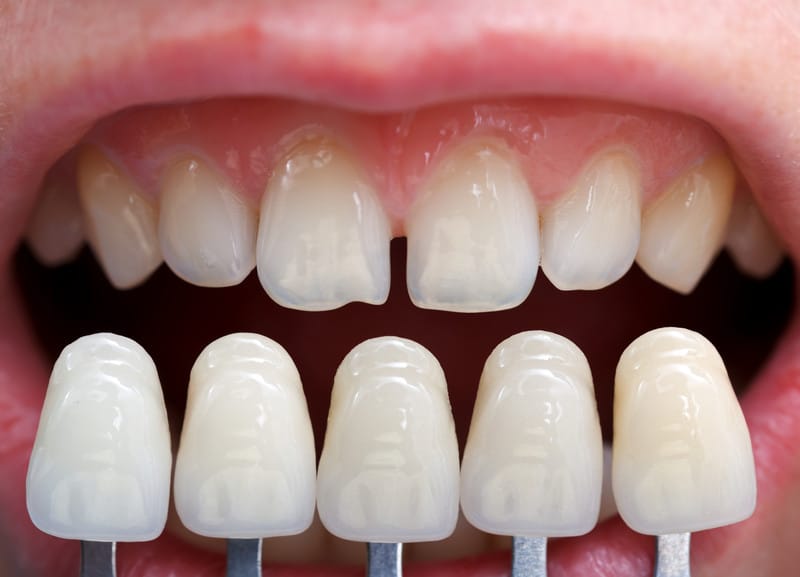
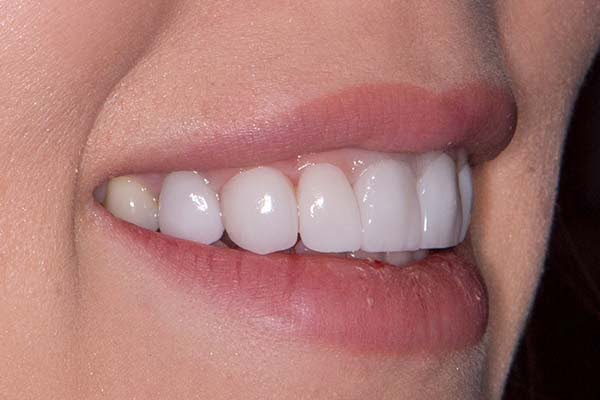
- Aesthetics: Both veneers and crowns offer cosmetic improvements. However, if you’re specifically looking to improve the appearance of your front teeth, veneers may be the better option as they offer a more natural and attractive outcome.
- Tooth preservation: Veneers are considered less invasive as they require less natural tooth structure removal than crowns. If preserving as much of your natural tooth as possible is important to you, this could be a decisive factor.
Frequently Asked Questions
Which is better, veneers or crowns?
The choice between veneers and crowns largely depends on your specific dental circumstances. Dental crowns are typically the ideal option for restoring severely damaged or decayed teeth, while veneers are better suited for improving the appearance of chipped, discolored, or slightly misaligned teeth.
Which lasts longer veneers or crowns?
Both veneers and crowns can last for several years with proper care. However, dental crowns tend to have a longer lifespan as they cover the entire tooth and provide more protection. Veneers are thinner and may require replacement after 10-15 years.
Which is expensive, veneers or crowns?
In general, dental crowns are more expensive than veneers. This is because the process of creating a dental crown involves more materials and labor compared to veneers. However, the cost can vary depending on several factors, such as the type of material used, location, and complexity of the procedure.
Can I use veneers instead of crowns?
In some cases, veneers may be used instead of crowns depending on the condition of your teeth. Veneers are ideal for cosmetic purposes, while crowns provide more structural support and protection for damaged teeth. Our team of dental professionals can help determine the best option for your specific needs.
How long does a veneer last?
Veneers can last anywhere from 10-15 years with proper care and maintenance. Regular dental check-ups and good oral hygiene habits can help extend the lifespan of your veneers.
Do crowns look natural?
Yes, modern dental crowns are designed to look and feel natural. They can be made from materials that closely resemble the color and texture of natural teeth, such as porcelain or ceramic. At Pinnacle Dental Group, we strive to create crowns that blend seamlessly with your natural teeth for a beautiful and realistic result.
Are veneers painful?
The process of getting veneers is typically painless as it only involves minimal removal of tooth enamel. However, some patients may experience slight discomfort or sensitivity after the procedure. Our team will ensure you are comfortable throughout the process and provide any necessary medication to alleviate discomfort.
Are veneers permanent?
Veneers are not considered permanent, as they may need to be replaced after 10-15 years. However, with proper care and maintenance, veneers can last for a long time. It is essential to follow good oral hygiene practices and avoid habits that can damage your veneers, such as biting or chewing on hard objects.
Can you remove veneers?
Yes, veneers can be removed if needed. However, it is not a reversible procedure as it involves removing a small amount of tooth enamel. Our team will assess your case and discuss the best course of action for your needs. It is important to weigh the pros and cons before deciding to remove veneers.
Final Thoughts
Deciding between veneers and crowns can be a daunting process, but with the help of your dentist at Pinnacle Dental Group, you can make an informed decision that meets your dental health goals and budget. Whether you’re looking to improve your smile or address structural issues, our team is dedicated to providing high-quality care and helping you achieve a healthy and beautiful smile.
Book an appointment with us today to discuss your options and start your journey towards a confident and dazzling smile. Remember, a beautiful smile starts with healthy teeth! So why wait? Give us a call, and let’s start your journey to excellent dental care.
References:
- Cleveland Clinic
- WebMD
- American Cosmetic Dentistry
- Healthline
- University General Dentists
